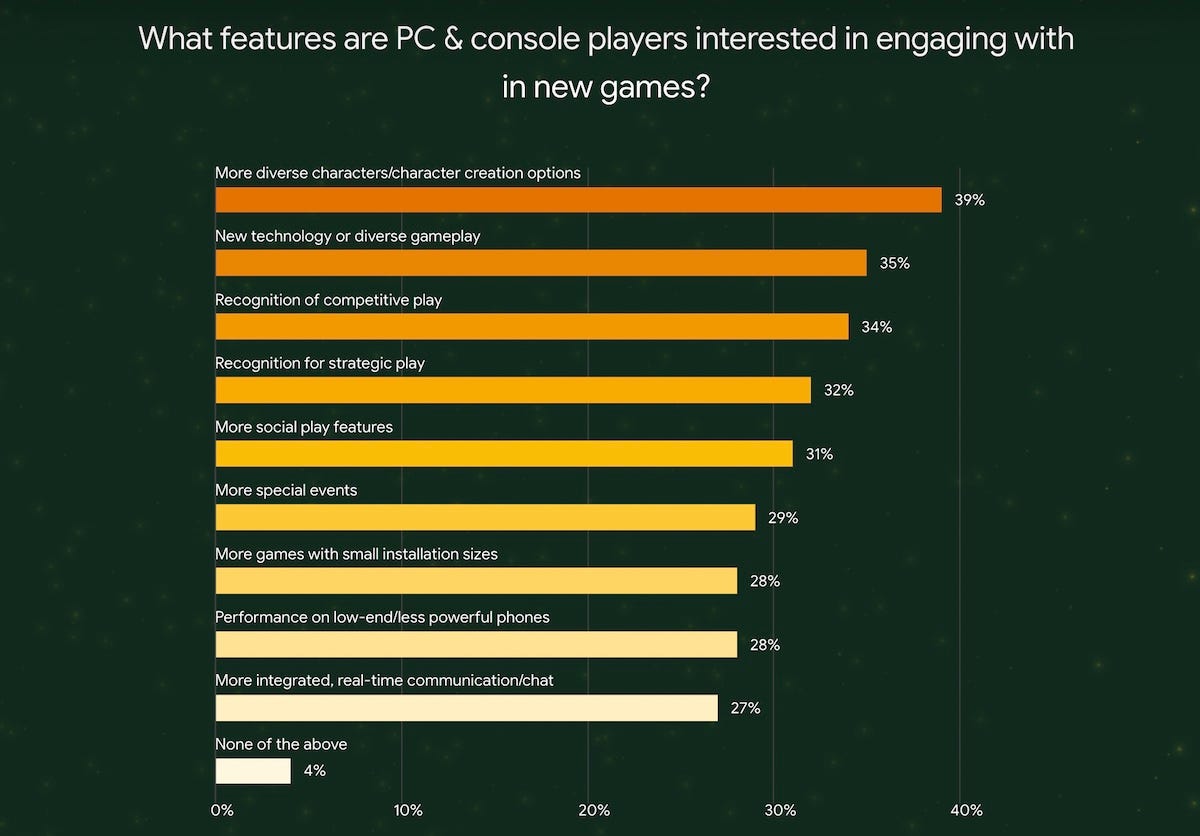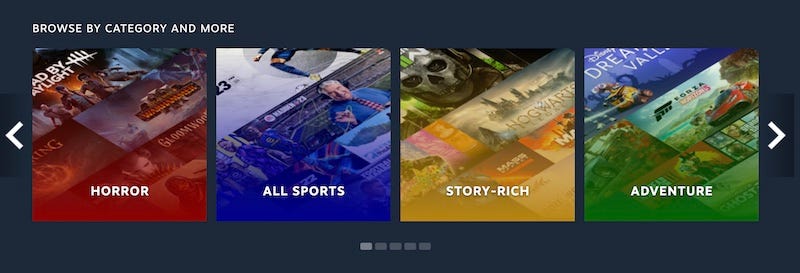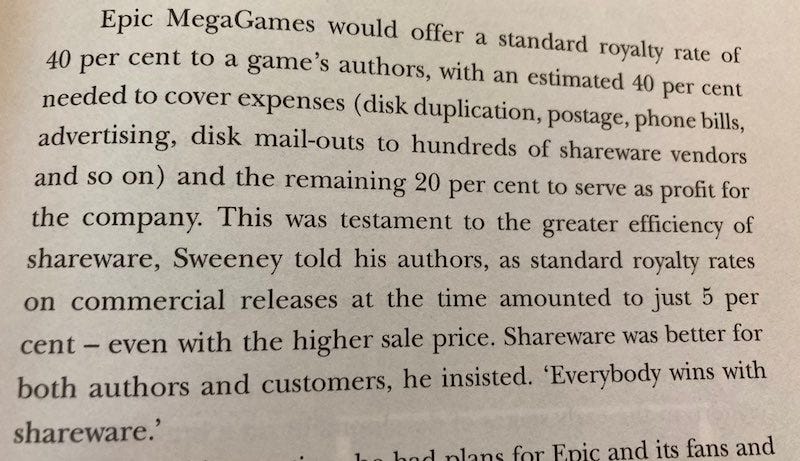What do players really want from new games, anyhow?
We don't know, but Google paid a research firm to ask folks.
[The GameDiscoverCo game discovery newsletter is written by ‘how people find your game’ expert & company founder Simon Carless, and is a regular look at how people discover and buy video games in the 2020s.]
Welcome back, Discover-arians, to the only newsletter you’re going to get this week that doesn’t mention the Queen passing away* - because we’re all about video game discovery, folks, why would we even do that? (*Oh. RIP.)
And, uhh, what else have we been doing recently? Why, finding out how exciting the competitive NES Tetris world champs can be, especially when well-explained by Tetris-only YouTuber aGameScout. (Gotta love niche YouTube channels!)
[If you want more data/insight, support us via a GameDiscoverCo Plus paid subscription! This includes Friday’s PC/console game trend analysis newsletter, a big Steam ‘Hype’ & performance chart back-end, eBooks, a member-only Discord & more. Sign up today.]
How PC and console players consume games..
We actually linked to a story about Google for Games’ 2022 PC & Console Insights survey a couple of weeks back. But we failed to look at the results in detail until ICO’s Thomas Bidaux started Tweeting about it the other day. And turns out it’s interesting, for a couple of reasons.
Firstly, these surveys aren’t cheap to commission and field, and Google’s just… putting the answers out there? Yes, we know it’s ‘thought leadership’. But we can’t get 14,356 global PC/console players to take surveys, so we’re happy to ride big on their largesse.
Secondly, there’s some intriguing questions asked - more wide-ranging than we’re used to in some surveys. So let’s have a quick rundown of some of the top findings:
The above question, about ‘features players are interested in engaging with’, has some woolly language in places. But what we get from it is that 39% of players want more diverse characters/creation options, 31% are interested in social play with others, and 29% are digging GaaS titles with unique in-game events.
There’s also a question about how many different games people play at the same time, which reveals 16% of people play one game at a time, 38% of people playing two titles at once, 25% doing three at a time - and roughly 20% of people playing four or more. That’s, like, really good context, right?
As for how people discover games, ‘YouTube videos’ is the largest ranked response, with 40% of those surveyed. But we also noted ‘friends and family recommendations’ (38%), console dashboard (17%) and Steam dashboard (16%), and Twitch streams (14%) as some key sources.
Finally, there’s a super-valuable ‘what influences you to try out new games?’ question, and 51% say ‘game genre I usually like’, 45% say it ‘looks fun in videos’, 43% say ‘reviews/ratings are good’, 36% said ‘trailers/screenshots interest me’, and 24% said they saw an influencer playing it. Genres and videos, folks - genres and videos!
This is a brief and concatenated view of the survey. And obviously, what players self-report about their discovery methods for games may not map 1:1 to how it actually goes down.
But we definitely recommend looking at the full Google-commissioned survey - which is segmentable by geographic region - for more insight on these, and various other (localization, in-game purchasing, why players retain/quit) notable subjects.
Steam rolls out ‘personalized shopping’ even wider
There’s a fairly major new change on Steam, with “big updates to the various tag, genre, category, and theme browsing pages across the Steam store. Previously released as a Steam Labs experiment, these new store hubs have been tested and iterated upon with player feedback over the past few months.”
What does this mean, in practical terms? Well, in addition to store hub improvement, there’s a new Steam front page ‘store hub browser’ (above). This shows even when not logged in, but personalizes to the types of game you play, post log-in. On hubs:
Valve says: “The contents of each hub is personalized based on your play history, network of friends, followed developers, and what you have on your wishlist.” It even shows featuring reason visually for the top games. Here’s an example for the Survival genre, which looks to be working well.
As for some of the top carousel ‘reasons for recommending’ that I’m seeing, the wording includes ‘currently ranked X in top sellers’, ‘friend X played this’ (or wishlisted it!), ‘similar to X game you played’, and even ‘recommended by curators you follow’. So this is pretty intelligent, transparent stuff.
Also worth noting, as Valve notes on its taxonomy work: “For many categories, we've hand-built an organization to surface the relevant sub-categories within. For example, the RPG store hub is organized into Action RPGs, Adventure RPGs, JRPGs, and more.”
There’s also a ‘recommended new releases based on what you’ve been playing’ section in store hubs. And intriguingly, I also got ‘recommended new releases from familiar publishers and developers’ when logged in on the Adventure hub, showing publisher names and logos underneath game names and icons.
This is some of the most wide-ranging and interesting discovery work available on any game platform. It’s done without ‘editorial features’, but it plays up well-rated, recommended, popular games fairly and transparently. (Sure, maybe it’s a bit ‘rich get richer’ - but in a very logical fashion.)
One comment we’ve seen - which we would partly agree with - is that these new ‘store hub browser’ categories on the Steam front page are often the broadest. So, you’ll get top-selling games tagged in there which don’t necessarily map well to traditional genre.
The best-case scenarios are specific subgenre tags like open-world RPG, which Valve linked to as a good example in their blog post. The least optimal are big tags that are attribute-like, such as puzzle, where any game with a small(er) puzzle element can dumped into the mix.
So titles like Ghost Watchers - not really a ‘puzzle game’, but well-regarded and high-selling - get featured there. And one of my recommended categories on the front page happens to be ‘All Sports’ - to which you can also say - who even likes ‘all sports?’ But, y’know, ‘perfection is the enemy of excellence’. And this discovery update is excellent.
The game discovery news round-up..
So yes, let’s round the week off in style, by poking at all kinds of new data and info available to us via the medium of ‘the Internet’, Here’s what we’ve got:
Lots of methodical/impressive Xbox stuff: Microsoft is starting to test new changes to the Xbox Home UI rolling out in 2023; there’s a /twitchgaming: ID@Xbox Fall Showcase on September 14th showcasing indie-ish titles; you now have the ability to start a game from a friend’s shared game clip or screenshot on mobile and PC, using Xbox Cloud Gaming.
The latest Steam Hardware survey has fixed some VR platform weirdness that crept in (for a second time?), so the numbers are worth looking at: 49.25% of Steam players use a Quest 2 headset (with PC passthrough), 15.4% a Valve Index HMD, 11.05% an Oculus Rift, 6.5% a HTC Vive, 4.4% a Windows Mixed Reality-compatible device.
How do you visualize genre opportunity in the PC, console, or even (in this case!) mobile space? Steve El-Sharawy has a post on LinkedIn showing how he created & printed microgenre infographics and made them tangible and universal: “Within minutes, groups of engineers, coders, artists, office managers were making data informed cases for producing games.”
The latest PlayStation 5 OS update is out & includes “several highly-requested features like 1440p HDMI video output and gamelists… the ability to request a Share Screen from a fellow party member, easily view new friends’ profiles, and receive a notification to help you join a friend’s game more quickly from a party chat.”
A trio of Survivor.io pieces: Axios on how TikTok is powering the mobile game’s breakthrough, Matej Lancaric going deep on the mobile UA strategy, and Nathan Brown poking around into how much of a ‘fast follow’ vs. clone of Vampire Survivors it is…
Following up the ‘best indie YouTubers’ piece, Vicarious’ Matt Brown mentioned KatherineofSky, a diverse YouTuber we missed, plus: Rimmy, Dan Field & Dr Horse (.fr), Hirnsturz (.de), El Escoses (.es). (We also got an Aliensrock shout-out, and a special mention to Potato McWhiskey, the best-named YT-er!)
Does the wording on your Steam launch discount look a little different this week? Perhaps because, as Patrick Seibert spotted: “Launch discounts on Steam are now displayed as INTRODUCTORY OFFER! Nice little flavour to differentiate them from normal discounts.”
A shout-out for the Game Devs Of Color Expo, which is happening virtually from September 15th-18th, and has a whole bunch of great talks and grants from/for under-represented devs. Consider being a sponsor if you’re not?
Some ‘subscription game’ updates: the first September tranche of Xbox Game Pass titles includes Disney Dreamlight Valley & Metal Hellsinger; Apple Arcade has confirmed that NBA 2K3 and Football Manager 23 are coming to Arcade at launch. (Football Manager is also Xbox/PC Game Pass Day 1.) Oh, and LG has cloud game subs on its TVs now, including Blacknut and Utomik Cloud (now) and Stadia (coming soon.)
How do you email (small) YouTubers with info about your game? There’s a new Reddit thread about that: “Don’t personalize your emails… Don’t mention another YouTuber made a video.” Oh, and a Wanderbots comment: “Getting a key + embargo info + everything else in my first email contact with a developer is great.”
Interesting microlinks: Forbes’ top creators of 2022 list includes a number of game-adjacent influencers; how can Apple build a $30 billion advertising business?; kids in the Philippines “were earning hundreds of dollars from a play-to-earn Minecraft game, until new rules sent the community into a tailspin.” (Yuck.)
Finally, as I Tweeted the other week, I was reading Richard Moss’ excellent new ‘Shareware Heroes’ book - about how Apogee, Id, Epic MegaGames & others pioneered the ‘try and buy’ model for PC games in the late ‘80s and early ‘90s.
And I discovered historical insight from Epic’s CEO: “Even back in 1991, Tim Sweeney was passionate about maximizing ‘platform cut’ for developers vs. the competition”:
[We’re GameDiscoverCo, an agency based around one simple issue: how do players find, buy and enjoy your premium PC or console game? We run the newsletter you’re reading, and provide consulting services for publishers, funds, and other smart game industry folks.]




